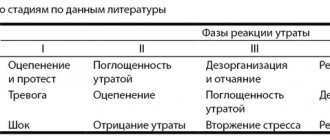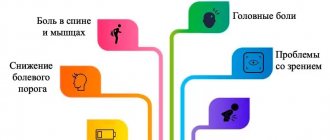People over 60 years of age often experience mental disorders with confusion, with symptoms reminiscent of schizophrenia and bipolar disorder. They are often accompanied by delusions, hallucinations, and paranoid manifestations without dementia. In this case, doctors suspect senile psychosis in elderly people. In psychiatry it has a synonym - senile. Relatives of this category of patients have a question: what to do in this case. We recommend contacting the Moscow clinic “Leto”. Our specialists treat mental disorders, including acute/chronic psychotic disorders. Phone number of our medical center: 8(969)060-93-93 . You can call him at any time and get a free consultation.
Senile psychosis, features and causes
The frequency of senile psychotic disorders is in the range of 12-25% of all mental illnesses in old age. The exact causative factors of the disease have not yet been established.
Psychiatrists suggest that the disease develops as a result of age-related changes, character traits and the influence of unfavorable living conditions.
More often, psychosis in an elderly person is characterized by:
- Women.
- Depressed individuals.
- Patients with a hereditary predisposition to this pathology.
- Persons with long-term chronic somatic diseases.
Why are mental disorders more common among older people?
Modern medicine has the ability to optimize the functioning of the nervous system of even a very elderly person. There are people over 80 years of age without any signs of dementia or “senile sclerosis.” Old age is not a disease. Dementia (senile dementia or senile insanity) and age-related depression are diseases with their own clearly defined causes and treatment options.
The nervous system of an elderly person has a number of features.
- Insufficient blood supply to the brain. With age, blood vessels, including those of the brain, become less elastic, and “plugs” – atherosclerotic plaques – appear inside the vessels. The brain finds itself in a state of lack of blood flow and nutrition. And brain cells are very “gluttonous” and under conditions of nutritional deficiency they work worse and then die. During this period, a kind of senile egoism and insomnia often appear.
- Slower brain cell renewal . The older we get, the slower the renewal process goes, especially in conditions of reduced blood flow.
- Changes in biochemical processes in the brain . An electrical impulse is transmitted from one nerve cell to another with the participation of special chemicals - neurotransmitters. These include, for example, serotonin, dopamine, norepinephrine. In older people, the ability to produce and accumulate these substances decreases. Therefore, the conduction of nerve impulses suffers, and, as a result, the overall productivity of the brain weakens, deviations in behavior, emotional, mental and motor spheres arise.
Our task at the examination stage is to unambiguously determine the dominant cause of brain suffering, then our treatment will be exactly as intended.
Two cases of vascular dementia (senile dementia) from our practice. The symptoms are similar, but the treatment required is different.
MRI of the brain. The brain appears gray, the cerebrospinal fluid appears black, and the affected areas of the brain appear white.
- LEFT – normal brain.
- IN THE CENTER – the brain is partially replaced by fluid, arrows indicate areas of reduced blood circulation. The reason is the formation of blood clots due to heart rhythm disturbances + the entry of these blood clots into the brain.
- RIGHT - brain mass is seriously reduced with replacement by fluid, white spots are an area of massive death of brain cells. The reason is a narrowing of the carotid arteries by 75% and 80% by cholesterol plaques.
Senile psychosis, types
Doctors at our clinic use the generally accepted classification of the disease.
It includes:
- Affective reactions.
- Paraphrenia.
- States of confusion.
- Mental disorders in severe internal diseases.
Each variant has a dominant syndrome, according to which their differentiation is made.
Causes of problems
As we said above, mental disorders are the result of a pessimistic attitude. The likelihood of their occurrence also increases if an elderly citizen:
- often exposed to stress;
- not eating well enough;
- leads a sedentary lifestyle.
There are many known cases of mental disorders after a stroke. They are also caused by serious health problems. For example, people over 80 with lesions of the vascular system often experience lacunar dementia.
How does psychosis manifest in the elderly?
Senile psychotic disorders identified by specialists at our health center are divided into several types. They can occur in isolation, with periodic attenuation and new exacerbations. Sometimes one set of symptoms is reduced to another. There are also isolated mental disorders that go into stable remission, which is an indicator of their effective cure. Let's consider the main symptom complexes.
Acute forms of senile psychoses
These are the problems our psychiatrists most often have to deal with.
Their development is caused by somatic ailments:
- Cardiovascular and respiratory failure.
- Hypovitaminosis.
- Diseases of the kidneys and liver.
Patients exhibit characteristic disorders:
Partial or complete disorientation in space and time with confusion.- Motor restlessness.
- Anxiety.
- Transient hallucinatory visions.
- Crazy statements.
The duration of symptoms is several days, less often weeks. After the end of the attack, prolonged asthenia and mild lethargy remain. The episode may be repeated.
Chronic senile depression
The severity of clinical manifestations of this form depends on the age of the patients (usually women).
The psychotic reaction consists of:
- Apato-adynamic complex.
- “Silent” depression, in which few people pay attention to the emerging symptoms. And this kind of patient is prone to suicide, which is a complete surprise to others.
- Hypochondriacal complaints with ideas of self-accusation, up to Cotard's delirium.
This senile psychosis lasts a long time - 10 or more years. Thanks to successful therapy in our clinic, it is possible to significantly mitigate its course. Intellect in this form practically does not suffer, only memory problems appear over time.
Chronic paranoid psychoses
The main manifestation of the disorder is the patient’s delusional ideas, with fear of harm from loved ones.
They believe that relatives or neighbors want:
- Bring their death closer.
- Poison.
- Kick out of the home.
- Rob.
Patients turn to various authorities for “protection”, initiate checks, etc. This kind of client retains complete social adaptation, and their nonsense is perceived by department officials as the truth until the circumstances are fully clarified.
Hallucinosis
Characteristic of old age (after 80 years).
Manifest:
- Vivid visual, tactile and auditory hallucinations.
- Severe memory impairment.
- Dermatous delirium. A person is sure that he has parasites and foreign objects on his skin that he cannot get rid of. The patient itches, brushes off non-existent objects, consults dermatologists, and constantly washes clothes and bed linen.
Hallucinatory-paranoid form
This option is characterized by:
- Delirium of damage.
- By adding hallucinations of fantastic content.
- Echo thoughts with hearing voices (schizophrenia-like course).
- False ideas.
This type of disease occurs continuously with slow progression, leading to gradual memory loss.
Senile paraphrenia
Psychotic disorder is manifested by false memories with fantasizing. Patients talk about incredible events, meetings, acquaintances that had no place in their lives. Patients often develop euphoria and delusions of grandeur. The painful episode lasts 3-4 years, then begins to gradually fade.
Symptoms of senile psychosis
As a rule, psychosis occurs acutely, sometimes its development is preceded by a prodromal period lasting one or several days, accompanied by difficulties with self-care, increased fatigue, and disturbances in appetite and sleep.
The main signs of senile psychosis:
- confusion;
- increased fatigue;
- hallucinations;
- rave;
- sleep disorders;
- appetite disorders;
- motor excitement;
- worsening somatic condition.
In chronic senile psychosis, depressive states are observed, more often diagnosed in women. The most favorable course of senile psychoses is characterized by the appearance of subdepressive states, accompanied by lethargy and adynamia; a feeling of emptiness and disgust for life.
In the chronic course of senile psychosis, the appearance of anxious depression, delusions of self-blame, and agitation, reaching Cotard's syndrome, is possible. However, now the number of depressive psychoses has sharply decreased, which is explained by the pathomorphosis of mental disorders.
The following symptoms are characteristic of chronic senile psychosis:
- depressive and paranoid syndromes;
- significant psychopathological disorders;
- prolonged delirium, hallucinations;
- productive diseases with relative preservation of intelligence and memory;
- dysmnestic disorders.
Diagnostics
At the appointment, the doctor at our clinic draws attention to characteristic symptoms that indicate the client has senile psychosis.
During examination and questioning of patients, the following is revealed:
- Preservation of intelligence.
- Stability and limited symptoms.
- Duration of deviations.
It is very important for a psychiatrist to distinguish senile psychosis from schizophrenia, manifestations of vascular pathology. For differential diagnosis, CT and MRI of the brain are used, which can reveal anatomical vascular defects and changes in brain tissue characteristic of other diseases.
Symptoms of age-related depression
The older the age group, the more often depression and dementia (senile insanity) are registered in it. Often elderly patients at our clinic complain of the following symptoms:
- Negative view of objects and events in life. An elderly man expresses dissatisfaction with youth, authorities, and the weather. Everything that was before is good, and everything that is now is bad.
- Constant grievances , especially against loved ones, a feeling of “damage done . An elderly family member unreasonably reproaches his loved ones that everyone has abandoned him, they want to take something away from him, they don’t love him, and no one needs him, that they are plotting something against him and want to harm him. This is not behavioral egoism or “harmfulness of character” - but a symptom of vascular disease of the brain (dementia or senile insanity).
- Impaired ability for integrative brain functions - recall, memorization, thinking. More often, memory for recent events suffers, while events that happened many years ago are remembered well.
- Cardiovascular attacks due to the slightest stress. A small stimulus is perceived as large, and the released stress hormones “hit” the blood vessels, hence a disruption of the heart rhythm, a hypertensive crisis or a heart attack.
- Pain in the back, joints, legs, head. Against the background of depression, the pain threshold always decreases and minor pains from arthrosis and osteochondrosis are perceived more clearly.
If you see such symptoms, seek help from a neurologist or psychiatrist. Perhaps brain cells die daily and in large numbers, and it is dangerous to wait. At the same time, if you start treatment in time, its results can be very noticeable. We often see cases of rapid, within 1-2 months, transformation of older people into energetic, positive, active and internally young people. Blood pressure and heart behavior are much calmer.
How to get to our medical center
All you have to do is call 8(969)060-93-93 . The call center manager will provide all the necessary information. From him you will learn the methods and cost of the upcoming treatment. The consultant will help you choose a room. After making an appointment, all you have to do is drive to the clinic. Our hospital is located in a convenient location. Getting to it will not be difficult, either by public transport or by your own. In cases where there are problems with the client, you can order a transfer service from us. Our staff will deliver the patient using convenient transport. All types of diagnostics and therapy are provided anonymously.
Treatment at the Echinacea Clinic
Treating older adults with age-related depression, dementia, and vascular problems is a process that requires patience and a positive attitude. We will be happy to help you.
- If necessary, we will offer you the help of a neurologist, psychiatrist, psychotherapist, cardiologist, examination of the heart and blood vessels, and the necessary laboratory tests.
- Visits to the clinic are only when absolutely necessary.
- We need cooperation between the doctor, the patient and his relatives, you must be prepared for this.
What do we do. First of all, we will find out what led to the brain damage. The reasons may be in different combinations:
- Atherosclerotic plaques;
- Increased blood clotting with blockage of small and large cerebral vessels;
- Stroke;
- Arrhythmias leading to the formation of microthrombi in the vessels of the brain;
- High blood pressure accompanied by spasm of cerebral vessels;
- Alzheimer's disease and other primary dementias.
In all these cases, the treatment will be different and will correspond to the source of the problem. For example, drugs to prevent blood clots will not affect the growth of atherosclerotic plaques and will not normalize blood pressure.
Our clinic has the necessary diagnostic capabilities to assess the condition of cerebral vessels, heart rhythm disturbances, blood clotting and cholesterol levels in an elderly person. If any types of diagnostics have already been performed before, be sure to show their results to the doctor, this will help avoid unnecessary tests.
Treatment will be based on the results of the research. It may include a number of medications, diet, daily routine and exercise, psychotherapy and, if necessary, even therapeutic hypnosis.
Cost of services
| CONSULTATIONS OF SPECIALISTS | |
| Initial consultation with a psychiatrist (60 min.) | 6,000 rub. |
| Repeated consultation | 5,000 rub. |
| Consultation with a psychiatrist-narcologist (60 min.) | 5,000 rub. |
| Consultation with a psychologist | 3,500 rub. |
| Consultation with Gromova E.V. (50 minutes) | 12,000 rub. |
| PSYCHOTHERAPY | |
| Psychotherapy (session) | 7,000 rub. |
| Psychotherapy (5 sessions) | 30,000 rub. |
| Psychotherapy (10 sessions) | 60,000 rub. |
| Group psychotherapy (3-7 people) | 3,500 rub. |
| Psychotherapy session with E.V. Gromova (50 minutes) | 12,000 rub. |
| TREATMENT IN A HOSPITAL | |
| Ward for 4 persons | 10,000 rub./day |
| Ward for 3 persons | 13,000 rub./day |
| Ward 1 bed VIP | 23,000 rub./day |
| Individual post | 5,000 rub. |
| PETE | 15,000 rub./day |
This list does not contain all prices for services provided by our clinic. The full price list can be found on the “Prices” , or by calling: 8(969)060-93-93. Initial consultation is FREE!
Treatment of senile psychosis
To relieve the manifestations of psychotic disorders, mandatory medication correction is required. Medicines are selected after examination on an individual basis. The doctor must take into account the characteristics of the patient, age, character, temperament and other aspects of the personality.
Drug therapy is based on:
Neuroleptics that eliminate delusions and hallucinations.- Antidepressants that relieve depression and anxiety.
- Sedatives that relieve the patient of fears, agitation, and sleep disturbances.
The treatment complex necessarily includes the following:
- Nootropics.
- Vitamins.
- Drugs for the treatment of somatic pathology.
Against the background of pharmacotherapy, psychologists work with clients, correcting their behavior. Each of our patients is cared for and monitored. Medical staff quickly and effectively provide relief to the sick.
Forecast and preventive measures
A stay in the hospital of our center with timely assistance provided gives reason to talk about a positive prognosis after treatment of acute conditions. Chronic psychotic forms, unfortunately, have an unfavorable course; doctors can only achieve temporary remission. After discharge, clients, under the supervision of relatives, should follow the recommended regimen, avoid neuropsychic overload, and treat existing pathologies of internal organs. When the first signs of exacerbation appear, simply dial 8(969)060-93-93.
Signs of senile paranoia
In old age, the content of delirium is usually associated with everyday situations, and it is distinguished by specificity and detail. Ideas of damage often arise. The patient is sure that someone is spoiling, breaking and stealing his things. It seems to him that in his absence, strangers are entering through windows or breaking into doors, picking up keys to cabinets, boxes, and taking away any pieces of furniture or household appliances.
Sometimes a person goes to the police with a report of theft, indicating exactly what is missing (and it can be both real and fictitious “valuables”). Often delusional ideas are associated with the fear of losing housing. The patient suspects neighbors or relatives, says that they want to “let him go around the world,” kick him out, lock him up in a nursing home (by the way, this is the reason for his categorical reluctance to see a doctor).
People suffering from senile paranoia tend to be litigious. They can go to court or threaten to sue for the slightest reason; they are sure that they are constantly being deceived in stores, when calculating pensions, and utility bills.
Typical signs of senile paranoia also include the following forms of delusion:
- Jealousy . A person is confident that “someone” is encroaching on his family and wants to “take away” his husband (wife). Sometimes delusional ideas concern children or grandchildren (for example, an obsessive thought that a son-in-law wants to leave his daughter and go to another, etc.). The patient torments not only himself, but also the “object” of jealousy, constantly striving to find evidence for his conjectures, and the conclusions made during such “investigations” cannot be explained logically.
- Hypochondriacal , accompanied by confidence in the presence of a serious disease of the internal organs. Symptoms associated with physiological age-related changes are very frightening for the patient. He constantly goes to the doctor, asking to be referred for additional examinations.
- Greatness . Characterized by belief in one's superpowers (healing, prophecy, reading other people's thoughts, etc.), and extraordinary talent.
Episodes of auditory or visual illusions cannot be excluded. But unlike schizophrenia and other disorders accompanied by hallucinosis, in senile paranoid syndrome the visions are short-lived and fully consistent with the content of delusion.








